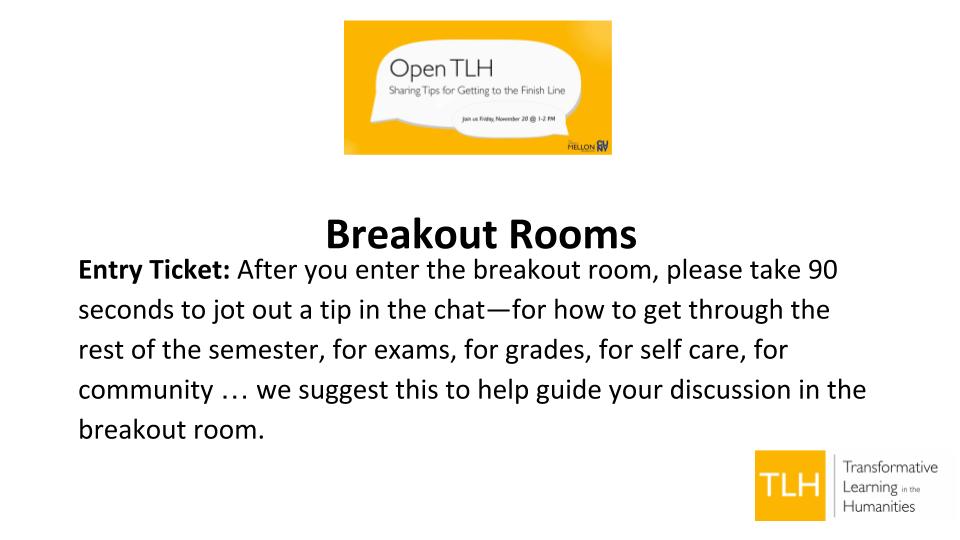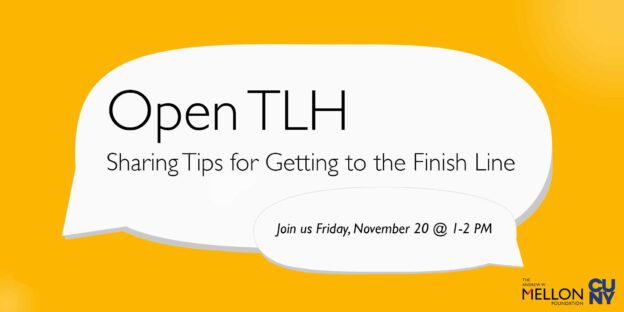On November 20, 2020, TLH hosted a peer-to-peer workshop, “Open TLH: Sharing Tips for Getting to the Finish Line,” with over 30 attendees. TLH staff kicked off the meeting by introducing themselves as well as sharing their own tips for surviving this grueling semester.
Annemarie Nicols-Grinenko, Director of TLH, talked about running an effective Zoom meeting and her work to try to limit how many meetings she put on colleagues’ calendars. Shelly Eversley, Faculty Co-Director of TLH, shared her strategy for using Zoom’s whiteboard feature with her Baruch students (a strategy we used later in the event, as shown above). Faculty Co-Director Cathy N. Davidson shared a tip she took from Professor Jonathan Sterne to have students use study sheets for final exams (learn more here and here). Assistant Director Khanh Le shared his strategies for co-creating a syllabus with students: he allows students to help create the course syllabus by choosing some of the readings. Finally, Executive Director Christina Katopodis shared her strategy for planning final exams: students help create and refine questions for the final exam.
She also made a few announcements, the most important being that applications for the Fall 2021 and Spring 2022 faculty seminars would open on January 25, 2021. Stay tuned here for more information.

Next, everyone else took a turn sharing tips and strategies in breakout rooms, with Faculty Co-Directors Shelly Eversley and Cathy N. Davidson popping in and out of group discussions. After 15 minutes of sharing, participants regrouped in the main Zoom room and contributed to a whiteboard sharing activity led by Assistant Director Khanh Le.

When participants reported back on what they had discussed in their groups, the good ideas just kept coming. Tips included:
- Using permanent or “static” teams or student groups as support throughout a semester: teams would stay together throughout the semester and those teams would have team assignments. They are held accountable to each other throughout the semester and the team leader rotates and reports back to the instructor. The purpose of the leader is to make sure no one gets left behind.
- Running a course within a language of “possibility” and a growth mindset a la Carol Dweck
- Turning off the self camera when videoconferencing
- Playing guitar during meetings or hosting after-class jam sessions with students
- One prof has a cat who often jumps on their lap while teaching, so their students come to know them and their pets
- Yellow dig, a useful external tool for creating community: https://yellowdig.com/
- Meeting one on one with students on the phone has become very important sort of phone office hours
- Reminding students to take a break
- Making a playlist for class
- Checkpoints throughout the semester as an alternative to having a bunch of assignments
- Scaffolding with revision options which gives students chances to improve, but also helps the instructor along the way understanding students’ progress and their mindset in the projects
- Using Google Forms to check in with students not just about their work but also their mental health as well (this should be anonymous so students can respond without having to name themselves)
- Providing a resource page in your syllabus for assistance outside the classroom, whether it’s for mental health or for other academic things
- Providing options such as a backup assignment (e.g., students can come to the zoom, or they can do this written assignment instead and that way they still have an option to show their understanding and engage with the class but if their time doesn’t work out to join a synchronous session, then they don’t have to)
- Tailoring the class content and assignments to allow students to talk about their life experiences, giving them questions, for example, in a language class, about how their week was, how do they feel, and let them use those gifts to answer
- Creating an ongoing do Google Doc for class notes and assigning one scribe per class period to take those notes so that students who miss class have access to that. It makes those students accountable for understanding and asking good questions so that they record good, comprehensive notes for their peers and this idea gives everyone in the class that opportunity
We didn’t have time to get to a poem, “Kissing in Vietnamese” by Ocean Vuong, which Assistant Director Khanh Le had chosen to close the meeting with. He writes about the poem, “I love this poem because not only it is beautiful (poetic imagery, etc.), but the meaning behind it. How we can heal- it is through collective memory, through acknowledging and processing our trauma and feelings.”
Here is the poem:
My grandmother kisses
as if bombs are bursting in the backyard,
where mint and jasmine lace their perfumes
through the kitchen window,
as if somewhere, a body is falling apart
and flames are making their way back
through the intricacies of a young boy’s thigh,
as if to walk out the door, your torso
would dance from exit wounds.
When my grandmother kisses, there would be
no flashy smooching, no western music
of pursed lips, she kisses as if to breathe
you inside her, nose pressed to cheek
so that your scent is relearned
and your sweat pearls into drops of gold
inside her lungs, as if while she holds you
death also, is clutching your wrist.
My grandmother kisses as if history
never ended, as if somewhere
a body is still
falling apart.


